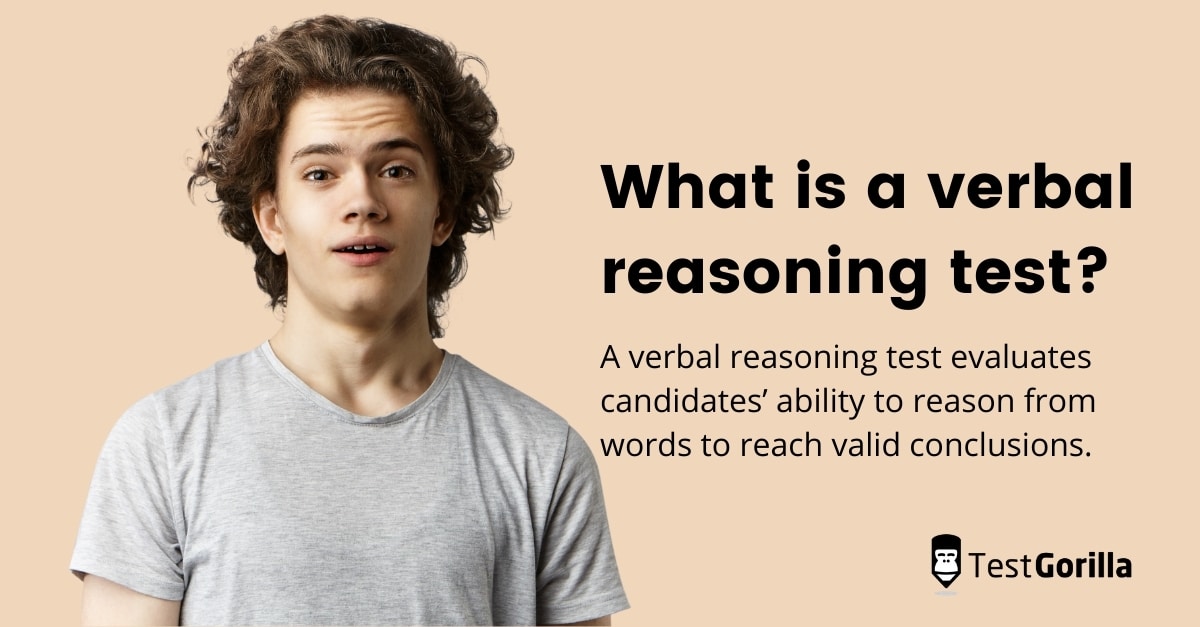When hiring an employee, you need to get it right the first time. To do that, you’ll need more than just resumes and interviews. For example, if you’re hiring for a role that requires a candidate with an excellent command of language and strong reasoning skills, a verbal reasoning test can help you identify your top applicants.
Table of contents
What is a verbal reasoning test?
Verbal reasoning tests offer an objective way to measure a candidate’s cognitive abilities, specifically verbal agility, during the recruitment process. This test measures the applicant’s ability to reason, comprehend, think critically, and express themselves verbally or in writing.
What do verbal reasoning tests measure?
The test measures a candidate’s ability to:
Comprehend information. Interpreting oral and written information in a limited amount of time.
Use reason and draw a logical conclusion. A verbal reasoning test does this better than reading a CV or conducting an interview.
Professionally express their thoughts in a clear manner. Clarity of thought leads to clarity of communication.
These three measurements will help you narrow down the search for a perfect candidate.
When should you use a verbal reasoning test?
These tests are used to assess candidates for a vast range of jobs. In fact, any role where information comprehension and interpretation are important should have a verbal reasoning test.
They are commonly used for candidates applying for legal, engineering, consulting, executive positions (especially in the financial sector), and civil service jobs.
When should you test verbal reasoning skills?
Verbal reasoning skills are a must-have in today’s workplace, especially as more and more roles become remote. These skills determine a candidate’s ability to:
communicate with peers, subordinates, and managers
read and gain insights from reports
write in a professional manner
discuss products and services with current and potential clients and customers
Here are a few job duties that require verbal reasoning skills:
understanding reports, case studies, and complex projects
writing blog posts or other marketing content
developing compelling, understandable presentations and pitch decks
Basically, you should try to fill any role requiring an advanced level of reading or writing (e.g., analyzing reports, synthesizing insights gleaned from data, or evaluating textual information) with a candidate with strong verbal reasoning skills.
Examples of these roles include:
Business analysts
Account managers
How verbal reasoning skills tests help improve hiring
The benefits of verbal reasoning skills tests improve the hiring process in three ways. First, they allow you to see where a candidate might need to improve if you hire them. Second, they reduce time-to-hire, and third, they identify candidates who can succeed in customer-facing roles.
Learning and development
Verbal reasoning tests help determine where you need to invest when it comes to learning and development. Even candidates who score well on a verbal reasoning test generally won’t score 100%.
Their results provide you with the areas where you might want to invest further resources in your new hire to increase their competence.
Shortening the hiring cycle
Verbal reasoning tests can be offered online and at scale. That means you can narrow down your search for the perfect candidate in a matter of minutes without additional manpower. As a result, your hiring cycle will be abbreviated because you can eliminate unqualified candidates early in the hiring process, save time, and reduce the cost of hiring.
Identifying good candidates for customer-facing roles
Verbal reasoning tests are beneficial when filling a customer-facing role. Roles that require dealing with customers daily (customer support, client relations, account management) need to be able to understand your product or service and convey that information to customers.
Because they will need to understand, communicate, and reason with clients and customers, a high score on a verbal reasoning test indicates that they have what it takes to do the job successfully.
What are the benefits of a verbal reasoning test?
Verbal reasoning tests are beneficial to hiring teams because they are:
Objective. It is an objective (and fair) way to measure the candidate’s reasoning skills. It’s therefore quantifiable and makes it easier to grade candidates objectively, eliminating biases.
Informative. The tests focus on a couple of core competencies such as logic, decision-making, and information comprehension and provide more information than a CV or work experience.
Efficient. This test allows hiring teams to screen candidates more efficiently. First of all, it helps verify the information the candidate provided in their resume. It’s not uncommon for candidates to stretch their skills on a CV to appear more skillful and knowledgeable than they truly are. The test helps deal with that. Secondly, the test helps in the screening process by eliminating the unqualified candidates early on. This way, neither the candidates nor the hiring team members waste their time.
Effective. When used for the right roles, a verbal reasoning test improves quality of hire. It helps you hire better candidates for your company— candidates who can communicate professionally, think analytically, and clearly express themselves.
How to conduct a verbal reasoning test
Unless you happen to be an expert (both at verbal reasoning and creating assessments), you’ll want to find a pre-existing test to evaluate your candidates’ verbal reasoning skills.
These tests generally present candidates with a passage of text. The candidate is then asked to assess and verify statements and questions about the passage. The test is designed to assess a candidate’s comprehension of the logic behind the passage, not the prior knowledge the candidate has about the subject.
Usually, the candidate will choose from three options: true, false, or can’t say.
TestGorilla’s verbal reasoning test adds another element. It has candidates identify relations between words (such as synonyms and antonyms) and replicate them by analogy.
Why you should use TestGorilla’s verbal reasoning test
Many companies provide a verbal reasoning test, but we have a specific set of benefits that makes our test effective.
Our test is made by a subject-matter expert. We assess potential subject-matter experts on their knowledge, skills, and ability. Once the test is made, it’s heavily reviewed before we add it to our test library. A peer review is conducted by another expert, and then the test is calibrated using hundreds of test-takers who have experience with the subject. Once a test is added to our test library, we continuously improve them through various feedback mechanisms.
The TestGorilla platform is user-friendly. Our platform is easy-to-use and automates much of the screening process to give you more time to assess your top candidates.
TestGorilla creates a positive candidate experience. This is because our tests are delivered through our candidate-friendly platform. Usually, candidates aren’t too fond of tests because they’re clunky and not a good way to show their skills. But our tests are easy to use and give the candidates a chance to prove themselves.
The TestGorilla platform is data-driven. We rank your candidates according to the scores from the tests made by our experts. So your HR teams can rely on the data provided to make decisions instead of making decisions according to “gut feeling.” We also provide various benchmarks so you can see how your test-takers’ scores compare to everyone else who has taken the test based on factors like educational level.
You can try it yourself by signing up for a free trial.
Related posts
Hire the best candidates with TestGorilla
Create pre-employment assessments in minutes to screen candidates, save time, and hire the best talent.
Latest posts
The best advice in pre-employment testing, in your inbox.
No spam. Unsubscribe at any time.

Hire the best. No bias. No stress.
Our screening tests identify the best candidates and make your hiring decisions faster, easier, and bias-free.
Free resources
This checklist covers key features you should look for when choosing a skills testing platform
This resource will help you develop an onboarding checklist for new hires.
How to assess your candidates' attention to detail.
Learn how to get human resources certified through HRCI or SHRM.
Learn how you can improve the level of talent at your company.
Learn how CapitalT reduced hiring bias with online skills assessments.
Learn how to make the resume process more efficient and more effective.
Improve your hiring strategy with these 7 critical recruitment metrics.
Learn how Sukhi decreased time spent reviewing resumes by 83%!
Hire more efficiently with these hacks that 99% of recruiters aren't using.
Make a business case for diversity and inclusion initiatives with this data.




















